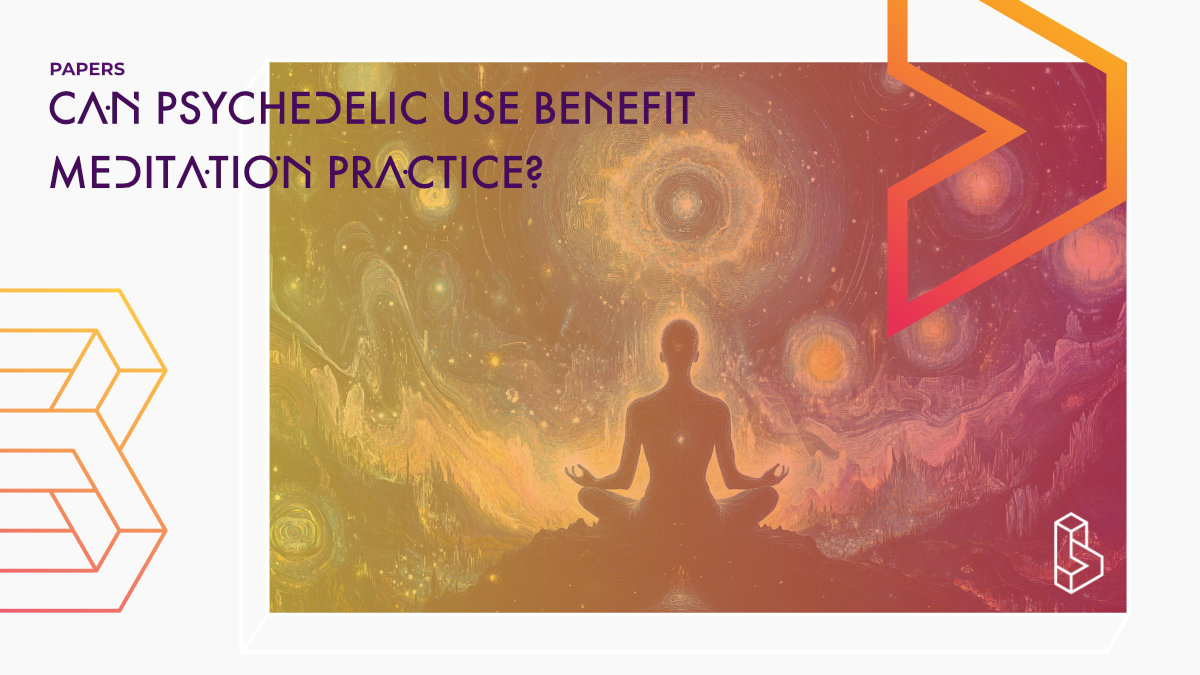This pre-print cross-sectional survey study (n=863) of meditators with psychedelic experience finds that most participants (73.5%) perceive psychedelic use as beneficial to their meditation practice. The study identifies four key predictors of this perceived benefit: regularity of psychedelic use, intention setting during use, agreeableness, and exposure to DMT.
Abstract of Can Psychedelic Use Benefit Meditation Practice?
“Introduction Meditation practice and psychedelic use have attracted increasing attention in the public sphere and scientific research. Both methods induce non-ordinary states of consciousness that may have significant therapeutic benefits. Thus, there is growing scientific interest in potential synergies between psychedelic use and meditation practice with some research suggesting that psychedelics may benefit meditation practice. The present study examined individual, psychedelic-related, and meditation-related factors to determine under what conditions meditators perceive psychedelic use as beneficial for their meditation practice.
Method Participants (N = 863) who had reported psychedelic use and a regular meditation practice (at least 3 times per week during the last 12 months) were included in the study. To accommodate a large number of variables, machine learning (i.e., elastic net, random forest) was used to analyze the data.
Results Most participants (n = 634, 73.5%) found psychedelic use to have a positive influence on their quality of meditation. Twenty-eight variables showed significant zero-order associations with perceived benefits even following a correction. Elastic net had the best performance (R2 = .266) and was used to identify the most important features. Across 53 variables, the model found that greater use of psychedelics, intention setting during psychedelic use, agreeableness, and exposure to N,N-Dimethyltryptamine (N,N-DMT) were most likely to be associated with the perception that psychedelics benefit meditation practice. The results were consistent across several different approaches used to identify the most important variables (i.e., Shapley values, feature ablation).
Discussion Results suggest that most meditators found psychedelic use to have a positive influence on their meditation practice, with: 1) regularity of psychedelic use, 2) the setting of intentions for psychedelic use, 3) having an agreeable personality, and 4) reported use of N,N-DMT being the most likely predictors of perceiving psychedelic use as beneficial. Longitudinal designs and randomized trials manipulating psychedelic use are needed to establish causality.”
Authors: Zishan Jiwani, Simon B. Goldberg, Jack Stroud, Jacob Young, John Curtin, John D. Dunne, Otto Simonsson, Christian A. Webb, Robin L. Carhart-Harris & Marco Schlosser
Summary of Can Psychedelic Use Benefit Meditation Practice?
Meditation practices and psychedelic use have gained increased attention in both public discourse and scientific research over the past two decades. Both methods induce non-ordinary states of consciousness that may have significant therapeutic benefits, leading to a growing interest in potential synergies between psychedelic use and meditation practice. Recent studies suggest that psychedelics may benefit meditation practice in various ways.
The researchers note that population-based surveys indicate approximately 17.3% of Americans engaged in some form of meditation practice in 2022, while about 15.9% of the US population had lifetime exposure to psychedelics as of 2018. Systematic reviews and meta-analyses suggest that both meditation practice and psychedelic use may be beneficial for a range of psychological symptoms.
There is emerging evidence of potential synergies between psychedelic use and meditation practices. Some research suggests that psychedelics and certain forms of meditation may target similar brain regions, have some degree of phenomenological overlap, and may have shared or complementary psychological mechanisms of change. For instance, both mindfulness-style meditation practices and psychedelic use have been associated with changes in the Default Mode Network (DMN), a network of interacting brain regions activated when a person is not focused on the external world.
Method
Participants
Find this paper
https://doi.org/10.1101/2024.08.27.24312677
Open Access | Google Scholar | Backup | 🕊
Cite this paper (APA)
Jiwani, Z., Goldberg, S., Stroud, J., Young, J., Curtin, J., Dunne, J. D., ... & Schlosser, M. (2024). Can Psychedelic Use Benefit Meditation Practice? Examining Individual, Psychedelic, and Meditation-Related Factors. medRxiv, 2024-08.
Study details
Participants
863
Humans

